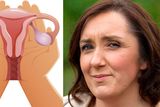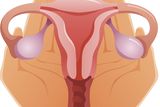Polycystic Ovary Syndrome: 'How I got my life back after years of battling my weight and the horrible symptoms of PCOS'
One in 10 Irish women suffer from polycystic ovary syndrome, an endocrinological disorder which causes an overproduction of male hormones that can wreak havoc with ovulation - making it difficult to conceive. Patricia Murphy meets two women who suffered with the condition for years, before a healthier diet and fitness regime all but abated their symptoms



Polycystic ovary syndrome (PCOS) is a disorder that can toy with the future, place a lock upon fertility and set women on a parallel path to diabetes. In addition, the severity of its symptoms are hugely affected by weight. The endocrinological disorder, with which one in 10 Irish women struggle, causes an overproduction of male hormones and this can wreak havoc with ovulation, making it difficult to conceive.
However, the greatest threat to the health of someone with PCOS is their propensity to develop type 2 diabetes later in life.
According to Dr Niamh Phelan, specialist in reproductive endocrinology at St James's Hospital in Dublin, women with PCOS are insulin-resistant, which means that their bodies are less effective at lowering blood sugar.
"Many of the body's cells require insulin to process glucose in the blood and in a woman with PCOS, the production of insulin is limited," says Dr Phelan. She says that insulin plays a key role in many of the body's metabolic actions, such as the control and break down of carbohydrates, fats and proteins.
"If unmanaged over time, the pancreas becomes unable to make enough insulin to keep blood sugars in the normal range, which can be diagnosed as type 2 diabetes," she says. "Ultimately, those with the disorder who do not manage their weight and tackle PCOS run a risk of between 25pc and 30pc of developing diabetes in the future."
While an estimated 10pc of Irish women suffer from PCOS, Dr Phelan says that many more live with polycystic ovaries, which is rarely problematic.
"During an ultrasound, one in four women would present with peripheral follicles on their ovaries and this could be defined as polycystic ovaries. This is rarely problematic on its own.
"A diagnosis of polycystic ovarian syndrome would often follow an ultrasound where imaging shows multiple peripheral follicles as well as a combination of other symptoms - including irregular or infrequent periods and indications of high levels of male hormones in the blood, such as excessive hair growth or male pattern baldness and acne," Dr Phelan says.
Read more:
So while polycystic ovaries are a component of the diagnosis, without any other features it does not mean someone has PCOS. A struggle with weight comes hand-in-hand with the disorder. And not only do sufferers gain weight easier, the weight is also much harder to lose. Dr Phelan says increasing levels of obesity in the Irish population is bringing with it an increasing number of referrals querying PCOS.
"Insulin resistance is thought to be a component in the development of PCOS as higher levels of insulin are associated with more irregular menstrual cycles and higher androgen levels," she says.
It's a catch 22, because people with PCOS gain weight easier because they are insulin-resistant, but the more weight they gain, the more resistant they will be to insulin.
"The body is not as effective at burning fat or fuel when the insulin levels are higher, which can make it more difficult to lose weight. However, weight loss can be successfully achieved with diet and lifestyle measures - in particular with exercise which helps to reduce insulin resistance," Dr Phelan says.
Deirdre McAleer is treating her PCOS. Photo: Tom Conachy
Excessive hormones in the blood are at the root of PCOS's most difficult symptoms. These include painful and irregular periods, excessive hair growth, male pattern baldness and acne. These factors put psychiatric nurse Deirdre McAleer's confidence to the test when she was diagnosed with polycystic ovary syndrome at 16.
"My symptoms began right when I began my menstrual cycle. I was having extremely painful and irregular periods from the beginning," the Donegal native says.
"By the time I was 14 I hadn't had a regular period and I was beginning to develop darker hair on my face and other parts of my body. It was so damaging to my confidence. I literally had what you could call a thick beard, and there was very little information about polycystic ovaries available to me," she says.
As with many PCOS sufferers, Deirdre (38) struggled with her weight for as long as she can remember. She says the issue became worse as she studied to become a nurse.
"My weight began drifting out of control after I was diagnosed and to control my facial hair, I was placed on the pill. This only worsened my problem," she says. "Despite being a nurse and understanding health, my weight piled on in my early 20s and I went from 11 stone to 15 stone in a matter of years."
As a nurse, Deirdre knew the health risks associated with unmanaged PCOS and the fear of developing diabetes before her 40th birthday frightened her. "I didn't want that future for myself," she says.
Women with PCOS often benefit from following a low GI (Glycemic Index) diet, which improves the body's ability to respond to insulin, aiding weight loss in sufferers.
After becoming fed up of battling the symptoms of PCOS that had plagued her for more than two decades, Deirdre decided to tackle her weight and lost six stone.
"I put my mind to a low-carb, high-protein diet and jumped on an exercise regime at my local gym, and have lost a significant amount of weight.
"My periods have regulated for the first time in my life and the issue of dark hair doesn't affect me as much anymore," says Deirdre. "For the first time in so many years, I feel as though I have a grip on the condition which really controlled my life for so long."
Deirdre's sister Grainne McAleer has also battled with the syndrome since her teens, and struggled to fall pregnant due to the barriers set up by unmanaged PCOS.
Yet, if Grainne had fallen pregnant as an overweight PCOS sufferer, she would have had a 50pc chance of developing gestational diabetes.
"My sister was trying to conceive for years and it was really having such an impact on her life. Like me she decided to just tackle her weight and once she had done that she quickly fell pregnant. It was such a weight lifted off her shoulders and a new baby was such a joy," says Deirdre.
Although striving to make healthy changes in terms of diet and exercise, Dr Phelan suggests certain drugs can also help.
Read more
Read more:
"Glucophage is a drug that is often associated with type 2 diabetes but it is also an extremely effective way to treat women with PCOS [because] it helps control blood sugar levels. Ultimately it is used to help regulate the menstrual cycles in women with PCOS and increase ovulation, but it can have metabolic effects which can help with weight loss," said Dr Phelan.
Ali Dunworth (35) from Maynooth was diagnosed with the disorder 10 years ago after her symptoms were mirrored in a magazine article she read about PCOS.
Ali's doctor prescribed Glucophage (metformin)which she said worked miracles in regulating her weight, alongside a healthier diet and regular exercise.
Read more
Read more:
"The Glucophage was a revelation. Like everyone I'd go through stages of trying to be really healthy and eating better but it never would work for me the way I'd see it work for others," she says. "Taking the Glucophage along with making these changes I finally started to see a difference.
"There's also something validating about being able to take medication that alleviates PCOS symptoms. So many people don't think it's treatable," Ali says.
"There's still a really backward view that it's just your lot in life to have bad periods or PCOS - but that's not the case. There may not be a cure but there are ways to make a huge difference," says Ali.
Join the Irish Independent WhatsApp channel
Stay up to date with all the latest news


















